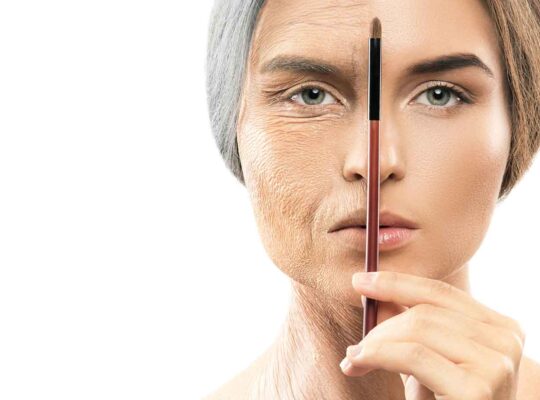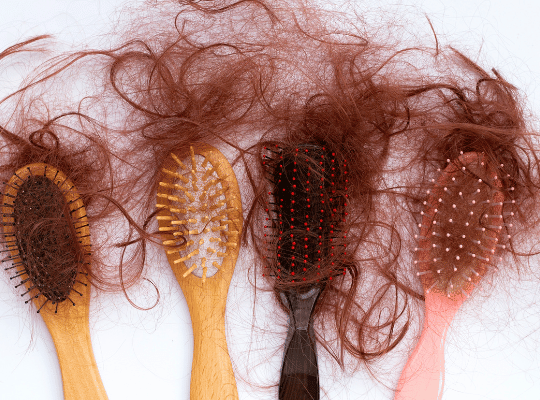Understanding Hair Loss During Pregnancy: Causes, Management, and Recovery
Have you noticed more hair falling out while you’re pregnant and wondered if it’s normal? Hair loss during pregnancy is something many moms-to-be worry about. Even though pregnancy is often linked with having thicker, fuller hair, some women experience thinning or even noticeable hair loss. Learning why this happens, how to manage it, and what to expect can help you feel more confident and less worried.
The Science Behind Pregnancy-Related Hair Loss
Hair Growth Cycle Explained
To understand why hair loss happens during pregnancy, it’s important to know a little bit about how hair grows. Normally, your hair goes through a cycle that includes three phases:
- Anagen (Growth Phase): This is when your hair grows actively. Most of your hair is in this phase.
- Catagen (Transitional Phase): This phase is short, and hair growth stops while the hair follicle starts to shrink.
- Telogen (Resting Phase): During this phase, the hair falls out, and the follicle gets ready to grow new hair.
Usually, about 85-90% of your hair is in the anagen phase (the growing phase), while the rest is in the telogen phase, where it naturally falls out.
Hormonal Changes During Pregnancy and Their Impact on Hair
During pregnancy, your body goes through a lot of hormonal changes. One of the main hormones that affects your hair is estrogen. Higher estrogen levels during pregnancy can make your hair stay in the anagen phase longer, meaning your hair grows more and falls out less. This is why many women notice thicker hair during pregnancy. However, these same hormones can also cause telogen effluvium, which is when more hairs than usual go into the resting phase, leading to more shedding.
Types of Hair Loss During Pregnancy
Telogen Effluvium
The most common type of hair loss during pregnancy is called telogen effluvium. This happens when more hair than usual enters the resting phase at the same time, causing noticeable shedding. While this type of hair loss is more common after pregnancy (during the postpartum period), some women experience it during pregnancy, especially if they are under a lot of stress or dealing with big hormonal changes.
Other Less Common Types
Some women might experience other types of hair loss during pregnancy, though they are less common. For example, alopecia areata is an autoimmune condition that causes patchy hair loss. Another condition is trichotillomania, which is when someone feels a strong urge to pull out their hair. While these conditions aren’t directly caused by pregnancy, the stress and hormonal changes that come with pregnancy can make them worse.
Timeline of Hair Loss in Pregnancy
First Trimester
In the first trimester, your body is working hard to support your growing baby, which can lead to big hormonal shifts. Some women might notice more hair shedding during this time because their bodies are under a lot of stress. Morning sickness and nausea can also make it hard to get all the nutrients you need, which can contribute to hair loss.
Second and Third Trimesters
During the second and third trimesters, hair loss often slows down. Many women enjoy their thickest, healthiest hair during this time because of the extended growth phase caused by pregnancy hormones. However, if you’re not eating well or are stressed, hair loss might continue.
Postpartum Period
The most noticeable hair loss often happens after the baby is born. This is called postpartum hair loss, and it’s due to the sudden drop in estrogen levels after delivery. This causes a lot of hair to enter the telogen (resting) phase all at once, leading to noticeable shedding around three to six months after giving birth. But don’t worry—this is usually temporary.
Causes and Risk Factors
Hormonal Fluctuations
The main cause of hair loss during pregnancy is hormonal changes. When your hormone levels, like estrogen and progesterone, fluctuate, it can mess with the normal cycle of hair growth, leading to temporary hair loss.
Nutritional Deficiencies
Pregnancy means your body needs more nutrients, and if you’re not getting enough, your hair might suffer. Iron, zinc, vitamin B12, vitamin D, and ferritin are all important for keeping your hair healthy. If you’re low on any of these, it could lead to hair loss.
Stress and Anxiety
Stress—whether it’s physical stress from pregnancy or emotional stress about becoming a parent—can make hair loss worse. The physical and emotional changes during pregnancy can trigger telogen effluvium or make other hair loss conditions more noticeable.
Managing Hair Loss During Pregnancy
Nutritional Interventions
Eating a healthy, balanced diet is key to preventing hair loss during pregnancy. Here’s a simple guide to some important nutrients, where to find them, and how they help your hair:
| Nutrient | Food Sources | Recommended Daily Intake | Benefits for Hair Health |
|---|---|---|---|
| Iron | Red meat, spinach, lentils | 27 mg | Prevents anemia and supports oxygen to hair follicles. |
| Zinc | Meat, shellfish, nuts | 11 mg | Helps with tissue growth and repair, including hair. |
| Vitamin B12 | Fish, meat, dairy products | 2.6 mcg | Essential for red blood cells, supports hair growth. |
| Vitamin D | Sunlight, fortified foods, fatty fish | 600 IU | Promotes hair follicle health and growth. |
| Ferritin (Iron storage) | Meat, beans, fortified cereals | Varies with blood levels | Stores and releases iron needed for healthy hair. |
Hair Care Tips
- Be Gentle: Avoid harsh treatments like bleaching or heat styling, which can damage your hair.
- Use Mild Shampoo: Choose a gentle, sulfate-free shampoo that won’t strip your hair of its natural oils.
- Condition Regularly: Use a conditioner to keep your hair moisturized and reduce breakage.
Stress Management Techniques
- Practice Relaxation: Try yoga, meditation, or deep breathing exercises to help manage stress.
- Stay Active: Regular exercise helps reduce stress and keeps your body healthy.
- Talk It Out: Share your feelings with a friend, family member, or counselor to help manage stress.
Treatment Options
Safe Treatments During Pregnancy
During pregnancy, it’s important to be careful with hair loss treatments. Here are some safe options:
- Prenatal Vitamins: Keep taking prenatal vitamins, which are designed to support both your health and your baby’s health.
- Topical Treatments: Mild, natural treatments like coconut oil or aloe vera can help nourish your scalp and hair.
Postpartum Treatment Options
After your baby is born, you might notice more hair shedding. Once your hormones start to level out, you can try other treatments like:
- Minoxidil: This is a topical treatment that can help with hair regrowth, but check with your doctor before using it after pregnancy.
- Dietary Supplements: Consider supplements like biotin or omega-3 fatty acids, which can help with hair regrowth.
When to Seek Medical Advice
Warning Signs
Some hair loss during pregnancy is normal, but there are certain signs that might mean something more serious is going on:
- Sudden, Patchy Hair Loss: This could be a sign of something like alopecia areata, which needs medical attention.
- Excessive Shedding: If you’re losing a lot of hair and it doesn’t seem to be slowing down, it’s a good idea to see a doctor.
Conditions That May Require Professional Attention
- Thyroid Issues: Conditions like hypothyroidism or hyperthyroidism can cause hair loss and should be checked by a doctor.
- Nutritional Deficiencies: Severe deficiencies in nutrients like iron or zinc may need to be treated with supplements.
Recovery and Hair Regrowth
Expected Timeline
It can take some time for your hair to grow back after pregnancy. Most women notice their hair getting back to normal within six to twelve months after giving birth. If your hair loss continues after a year, it might be time to talk to a dermatologist.
Tips for Promoting Healthy Hair Regrowth
- Eat a Balanced Diet: Focus on foods that are rich in vitamins and minerals that support hair growth.
- Stay Hydrated: Drinking plenty of water helps keep your hair and scalp hydrated.
- Avoid Over-Styling: Give your hair a break from heat tools and tight hairstyles that can cause breakage.
Emotional Impact and Coping Strategies
Addressing Anxiety and Self-Esteem Issues
Hair loss can be hard to deal with, especially when you’re already going through so many changes. If you’re feeling anxious or self-conscious about your hair, it’s important to talk about those feelings and find support.
Support Systems and Resources
- Talk to Loved Ones: Sharing your feelings with someone you trust can help you feel better.
- Join a Support Group: Connecting with other women who are experiencing the same thing can provide comfort and advice.
- Consider Counseling: If hair loss is making you feel really down, talking to a therapist might help.
Conclusion
Hair loss during pregnancy can be worrying, but it’s usually temporary. By understanding the causes, managing stress, and taking care of yourself, you can help minimize hair loss and encourage healthy hair growth. If you’re concerned about your hair, don’t hesitate to talk to a doctor. Remember, you’re not alone, and there’s help available to support you through this experience.
FAQs
- Is hair loss during pregnancy normal?
- Yes, hair loss during pregnancy is pretty common because of hormonal changes, and it usually gets better after childbirth.
- Can stress during pregnancy cause hair loss?
- Yes, stress can trigger hair loss during pregnancy, especially a condition called telogen effluvium.
- What can I do to prevent hair loss during pregnancy?
- Eating a healthy diet, managing stress, and being gentle with your hair can help prevent hair loss.
- Will my hair grow back after pregnancy?
- Most of the time, hair that falls out during pregnancy will grow back within 6 to 12 months after you have your baby.
- When should I see a doctor about hair loss during pregnancy?
- If you notice sudden, patchy hair loss, or if your hair loss is very severe, it’s a good idea to talk to a doctor.















